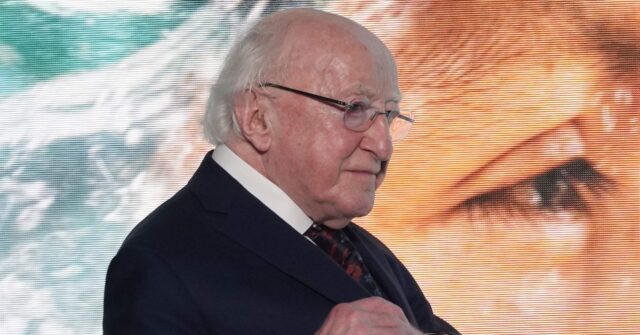The diplomatic landscape between Israel and Ireland has taken a significant turn, marked by escalating tensions between Israeli Foreign Minister Gideon Sa’ar and Irish President Michael D. Higgins. On a recent Tuesday, Sa’ar labeled Higgins an “antisemitic liar” following claims made by the Irish president that Israel was attempting to establish settlements in Egypt, a region from which it withdrew in 1979. This incident highlights the deepening rift that developed earlier in the year, when Ireland, alongside countries like Norway and Spain, chose to recognize Palestine as a state in response to the tragic events following the October 7 terror attacks. Ireland’s decision to support South Africa’s legal case against Israel, accusing the country of “genocide” at the International Court of Justice (ICJ), exacerbated the situation, prompting Israel to close its embassy in Dublin.
In his remarks, Sa’ar condemned what he perceived as antisemitic rhetoric emanating from the Irish government, simultaneously accusing Higgins of spreading falsehoods regarding Israel’s territorial intentions. Higgins, in defense of his statements, claimed that Israel had engaged in “slander” toward the Irish people. He further alleged that Israel had breached the sovereignty of three neighboring countries—Lebanon, Syria, and Egypt—which Sa’ar vehemently dismissed as unfounded assertions. The Israeli foreign minister stressed that Israel’s military actions in Lebanon and Syria were measures taken in self-defense against aggression from groups such as Hezbollah and radical Islamists. He firmly rejected Higgins’ claims about Egypt, framing them as a distortion of historical facts concerning Israel’s significant sacrifices in the peace agreement that saw its withdrawal from Sinai.
The response from Israeli officials extends beyond diplomatic squabbles; it addresses historical grievances and contextualizes current security concerns. Sa’ar’s pointed remarks emphasize that Israel will not tolerate any threats from neighboring territories and asserts its readiness to act proactively to protect its citizens. Amidst this tense backdrop, the Israeli minister called attention to Ireland’s historical neutrality during World War II, suggesting that such a stance undermines Ireland’s moral authority to criticize Israel’s actions in the contemporary geopolitical landscape.
Public opinion within Ireland appears to diverge significantly from its government’s stance, with recent social phenomena suggesting a notable pro-Israel sentiment among the Irish populace. For example, during the Eurovision Song Contest, despite an entry calling for a boycott of Israel, the Israeli act garnered substantial support from Irish viewers, which indicates that many citizens may not align with their government’s anti-Israel policies. This sentiment may reflect a broader trend where public attitudes toward Israel are more favorable than those expressed by political leadership, raising questions about the impact of government rhetoric on bilateral relations.
The growing diplomatic discontent serves as a microcosm of larger geopolitical developments in the Middle East and the international community’s evolving perspectives on the Israeli-Palestinian conflict. As countries increasingly take sides in this long-standing dispute, statements and actions taken by national leaders can starkly define international relationships, leading to potential isolation or unexpected alliances. The situation exemplifies how historical grievances, contemporary security dilemmas, and public sentiments interweave to shape the narratives countries present on the world stage.
As these tensions continue to unfold, it’s clear that the remarks exchanged between Sa’ar and Higgins will likely have lasting implications for Israeli-Irish relations. The diplomatic row illustrates not only the intricacies of international politics regarding Israel but also underscores the broader implications for response frameworks across Europe and beyond. How these nations navigate their differing historical narratives, public opinions, and security concerns will significantly dictate the next chapters of their foreign policies and diplomatic interactions.

